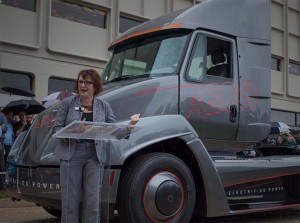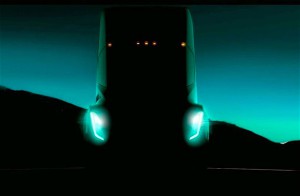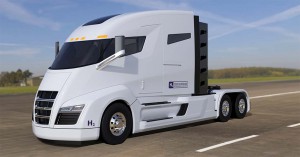The battery-powered truck market is the new hotness as Volkswagen AG and Navistar International Corp. said they were partnering on a new EV truck that would hit the market in 2019.
Executives from the two companies said they would jointly produces a new medium-duty truck powered by batteries the end of that year, according to Reuters. They also said they would be producing next-gen “big bore” diesels.
The two companies joined forces last year when VW took a 16.6% stake in Illinois-based Navistar. Executives said they expect the pairing will save $500 million in development costs during the first five years of the partnership.
The announcement of the new Class 6 or 7 battery-electric truck from the pair shows that there is plenty of interest in the segment. Tesla has made plenty of noise recently about its electric truck. It was supposed to unveil the beast this month, but has put off the debut until next month.
Indiana-based Cummins, a company already well known for its diesel and natural gas truck powertrains. rolled out a Class 7 concept it dubbed the Urban Haul Tractor recently. The electric truck is similarly targeting users who need to transport finished goods and raw materials in urban areas, typically clocking around 100 miles a day.
(Tesla to face challenges taking lead in electric trucks. For the story, Click Here.)
A number of other players are exploring the market for electric trucks, including Daimler AG, which is developing models for several of its five different truck brands. That includes Fuso, which hopes to go into production by 2019 with the eCanter, a light duty model expected to have a range of around 60 miles.
The Mercedes Truck brand is working up a heavy-duty distribution truck based on the Urban eTruck concept that will share a lithium-ion battery pack developed for a hybrid version of the Mercedes Citaro urban bus.
Meanwhile, Salt Lake City, Utah-startup Nikola Motors is taking an alternative approach to zero-emissions trucking. It hopes to be in production in a couple years with two heavy-duty trucks powered by hydrogen fuel cells. These would match, even exceed, the range of conventional long-haul rigs, at 1,200 miles per tank.
(Click Here for more about why Tesla’s EV semi likely to fall short of long haul norms.)
While there are even fewer hydrogen pumps than electric charging stations in the U.S., Nikola plans to set up a network of its own refueling centers across the country and will include the price of fuel in the cost of its Nikola One and Two trucks.
VW, which produces Class 6 and 7 trucks through its Scania and MAN units, plans to test nine trucks in Austria, according to Reuters, with payloads of about 18 tons and a range of about 300 miles. The timing of the truck is important in a keep-up-with-the-Joneses type market, but also an EV-based truck becomes more important as countries, such as China, France, Great Britain and Norway, continue to talk about banning gasoline- and diesel-powered vehicles in the next 20-plus years.
VW and Navistar officials believe the joint development of common hardware and software for connecting trucks to the internet, and of next-generation large diesel engines, could slash the companies’ costs.
(To see more about Nikola’s new hydrogen-powered heavy hauler, Click Here.)
Volkswagen plans to launch a cloud-based connectivity platform by the end of the year that will not be tied to a specific vehicle brand, and that will be the basis for the shared system. The companies plan to ultimately connect 650,000 vehicles, and create a common marketplace for app developers, the companies said.



